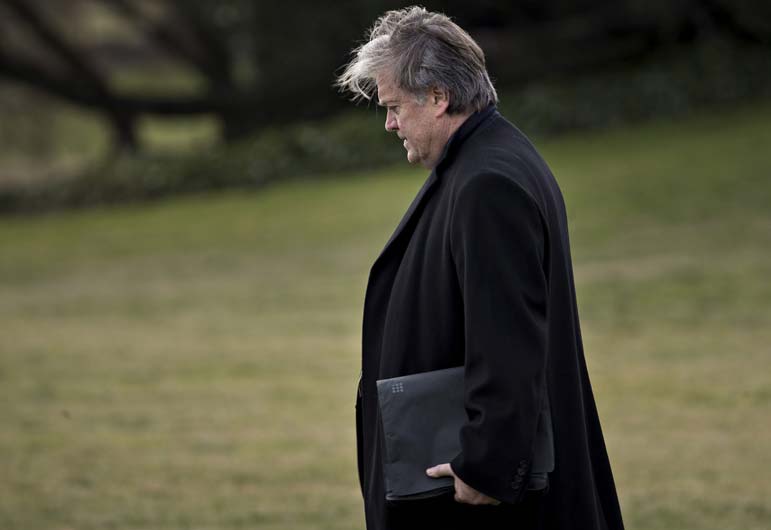 Andrew Harrer | Bloomberg
Andrew Harrer | Bloomberg
Since President Donald Trump's transition, Bannon had been pushing for a new grand strategy that would consolidate U.S. government efforts on China, confront China economically in multiple ways and revitalize the U.S. pivot to Asia that was initiated but left incomplete during the Obama administration. Bannon was assembling a coalition of like-minded China hands both inside and outside government to help.
Now, those who opposed Bannon's China efforts inside the administration are positioned to reassert their control over the relationship and stifle many of Bannon's key initiatives. That could be a boon for the status quo - and a relief to the Chinese government.
One of Bannon's final acts before leaving the administration was to announce in an interview that to him, "the economic war with China is everything." He argued the United States must marshal all elements of national power to confront China in various spheres or yield world hegemony.
"Bannon's particular unique idea was that this is a civilizational challenge," said Michael Pillsbury, who met with Bannon regularly on China over the past year. "His warning is, if they surpass us, they will have earned the privilege of redesigning the world order."
As a special assistant to Chief of Naval Operations Adm. Thomas Hayward four decades ago, Bannon became enamored with the work of the Pentagon's Office of Net Assessment, led for decades by Andrew W. Marshall. Bannon believes the United States needs a long-term strategy for maintaining advantage over China similar to what Marshall helped devise for the Soviet Union, while acknowledging that the China challenge is much harder.
Behind the scenes, Bannon had been busily operationalizing his plan to win the economic war with China. He spent 50 percent of his time on China, he liked to tell colleagues. Several of his China agenda items will continue to have advocates, including National Trade Council Director Peter Navarro and Commerce Secretary Wilbur Ross.
As Bannon has acknowledged, he was opposed by other top officials, including National Economic Director Gary Cohn and Treasury Secretary Steven Mnuchin. The Chinese government has also cultivated close ties with Jared Kushner and Secretary of State Rex Tillerson, with the help of former secretary of state Henry Kissinger.
The Kushner-Kissinger view holds that the U.S.-China relationship is too complex and important to risk throwing into disarray. They advocate cooperation over confrontation and integration over isolation. China shares that view and wants to set forth a new model of great power relations based on mutual respect and noninterference.
In Bannon's view, the liberal international order the United States led since World War II has ceased to work in America's interests. The theory that bringing China into that structure would transform China has failed and now the Chinese government abuses those systems to siphon huge amounts of wealth, technology and know-how from the United States and its partners, he believes.
He also sees a new China policy as a pillar of his plan to reorient American politics around economic nationalism. He views the rebalancing of the U.S.-China economic relationship as key to returning manufacturing jobs to the United States and vice-versa.
Now that Bannon is gone, the Trump administration officials pushing for that realignment have lost their champion. "You had a guy at the chief-of-staff level leading that charge. Losing him creates a huge imbalance now," one White House official said.
Bannon had some successes on China, but they might not endure. Earlier this month, Trump ordered a review of China's intellectual property theft. The future of that effort is now in the hands of U.S. Trade Representative Robert E. Lighthizer.
Bannon pushed China hawks for positions throughout the federal bureaucracy but did not last long enough to oust Susan A. Thornton, the acting assistant secretary of state for Asia, as he wished.
The Trump administration has initiated some China-related trade actions, but Bannon was pushing for many more. He also wanted the U.S. government to take a much harder line on Chinese acquisition of American companies and Chinese control over sensitive resources.
Bannon believed he could fuel a growing consensus that the China problem is getting worse, that U.S. strategy on China is adrift and the current international order is failing to address that reality. That diagnosis is correct, but there's no agreement on the cure.
If the "globalists," as Bannon calls them, don't address the real problems with China that Bannon identifies and offer alternative solutions, they will ensure that the eventual confrontation with China that Bannon predicts will play out on Beijing's terms.
Comment by clicking here.


 Contact The Editor
Contact The Editor
 Articles By This Author
Articles By This Author